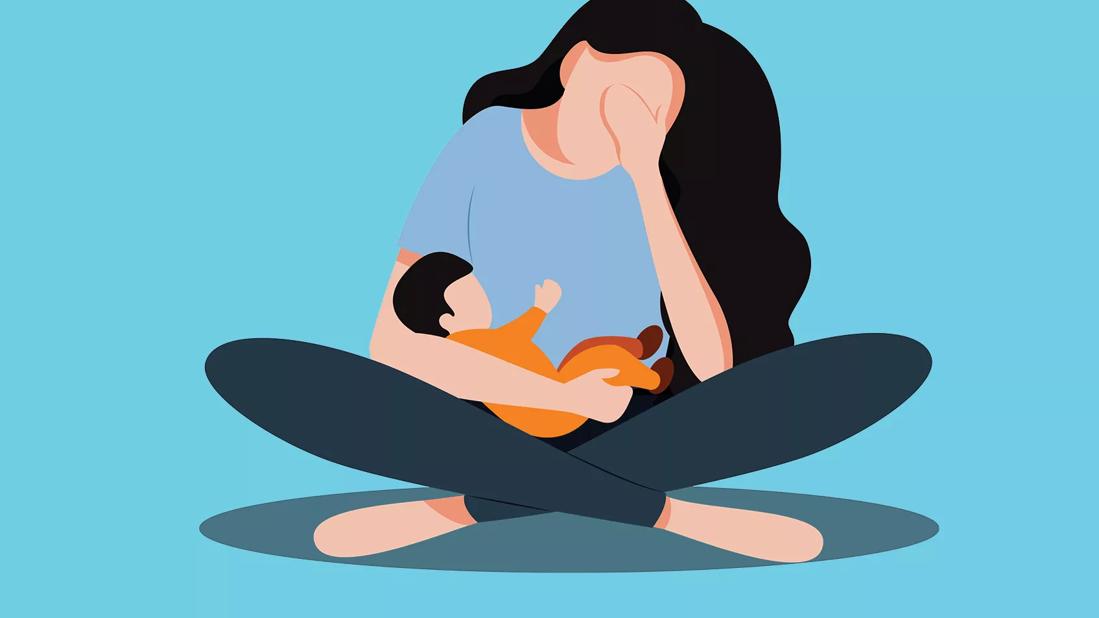It’s normal to experience some changes

Image content: This image is available to view online.
View image online (https://assets.clevelandclinic.org/transform/243047e9-8851-431a-893a-1e77b96e5f7f/ThePostpartumPoops-1310212368-770x533-1_jpg)
A frustrated mother holding her baby
After giving birth, it can take a while for your body to get back to its pre-pregnancy state. Physically and emotionally, you’re trying to recover from a major event that’s caused many changes — to your hormone levels, your muscles and ligaments, and even your internal organs.
Advertisement
Cleveland Clinic is a non-profit academic medical center. Advertising on our site helps support our mission. We do not endorse non-Cleveland Clinic products or services. Policy
All of these changes in turn can affect your bodily functions. Ob/Gyn Erica Newlin, MD, explains what you can expect from pooping during the postpartum time.
As your body recovers from giving birth, the pelvic ligaments and muscles that hold your bladder, uterus and colon can feel stretched or weakened. “Some may even experience a little bit of what doctors call prolapse, when it almost seems like the bladder is falling into the vagina,” says Dr. Newlin. The stretching and temporary weakening of those pelvic muscles can make it harder to poop as well.
Chances are, you’ll experience urine leakage before you leak poop. However, if you have severe tearing in your perineal area, which is located between your vagina and the anus, it can happen.
“Third-degree tearing involves the muscle around your anus, while fourth-degree tearing involves the anus itself,” says Dr. Newlin. “For women who have had these third- and fourth-degree tears, I hear about poop leakage.”
Thankfully, these tears are rare.
“Women are very worried about tearing, but often after delivery, it’s not quite as bad as they thought that things would be,” says Dr. Newlin. “With first-time parents, we see the second-degree tear a lot. That one affects the muscles of the perineum.”
Advertisement
If you’re experiencing poop leakage around six weeks postpartum, talk to your doctor. “That would be the time when I would involve pelvic floor physical therapy or one of our sub-specialists,” says Dr. Newlin.
After giving birth, when is it normal to have your first poop? It depends, says Dr. Newlin. “With a vaginal delivery, it may not be very delayed,” she says. “You may poop in that first day or two after delivery.”
Pooping after a C-section, however, can be a different story. “Sometimes, after a C-section, the bowels can take some time to wake up since you’ve just gone through a major surgery,” explains Dr. Newlin. “It can take three or four days for your first poop after delivery.” That same timeframe holds true if you’re taking opioid pain medications.
Video content: This video is available to watch online.
View video online (https://cdnapisec.kaltura.com/p/2207941/sp/220794100/playManifest/entryId/1_5d1w00zi/flavorId/1_5f3sgelj/format/url/protocol/https/a.mp4)
Pooping After Childbirth: What You Need To Know
What you need to know about pooping after childbirth.
Postpartum constipation is “super common,” notes Dr. Newlin. That can be due to opioid pain medications, but also from taking iron after delivery, which happens after a significant blood loss. Sometimes, breastfeeding can be dehydrating, which can also lead to constipation, she adds.
Yes, stool softeners are safe to use, and a very common medication women take after giving birth. “There can be some pain when pooping, particularly if your stools are hard,” says Dr. Newlin. “We often give you medication after delivery just to keep those stools soft. And we almost universally give people a stool softener when they leave the hospital, as a just-in-case measure.”
Stool softeners can also help with constipation from opioid pain medications. And Dr. Newlin adds that if you have a higher-grade perineal tear, like those third- and fourth-degree tears, it’s very important to keep your poop soft because you want to avoid putting pressure on those stitches.
Hemorrhoids are very common during pregnancy, too. Dr. Newlin says giving birth can irritate hemorrhoids, as can constipation. In the end, it comes down to trying to keep your stool soft. “Sometimes, it’s as simple as giving someone a stool softener,” Dr. Newlin reiterates.
“Something like MiraLax® can help, too. Or we’ll often give women cooling pads, like pads with witch hazel in them. Some sort of topical steroid can also help decrease inflammation.”
Advertisement

Sign up for our Health Essentials emails for expert guidance on nutrition, fitness, sleep, skin care and more.
Learn more about our editorial process.
Advertisement
Yes, new fathers can experience mood changes after bringing baby home
But if you’re worried, don’t hesitate to call your doctor or midwife
Heavy bleeding, pain and persistent sadness could be something more serious
Having sex after giving birth isn’t only about being medically ready
Belly wraps provide physical support after you give birth
Sad feelings and teariness that persist are a sign
Patience is the best solution
For some women, periods become problematic
Although it could be used as a moisturizer, this new trend is not recommended
Communicating clear limits helps protect your time, energy and emotional well-being
High cholesterol can be genetic, but testing and treatment can lower your heart disease risk